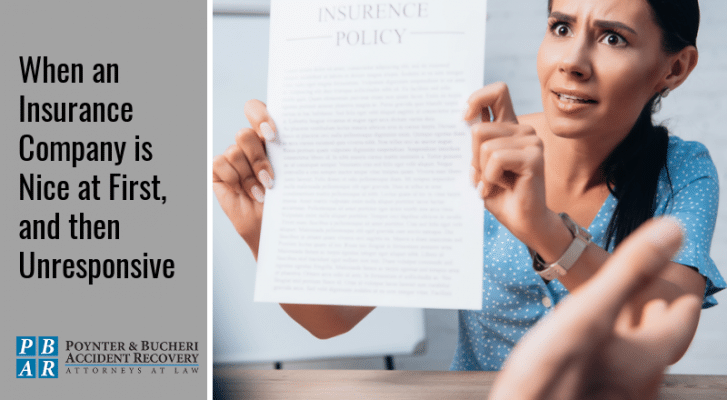
When an Insurance Company Is Nice at First, and then Unresponsive

Following an accident, you’ll have to deal with all of the stress, trauma, and injuries that accidents can cause. After your insurance company has been notified of an accident, the company may be responsive in fulfilling its duty to provide compensation for your claim…at least at first.
But insurance companies, at the end of the day, ultimately serve themselves. That’s why some companies can be either unresponsive or suddenly become unresponsive after a period of time. Insurance companies try their best to avoid making large payouts, and using silence and unresponsiveness is one of their tactics. If your insurance company has gone silent, don’t give up. We’ll take a closer look at what causes this unresponsiveness and what to do about it.
Reasons for delays and unresponsiveness
Insurance companies might try and quickly settle a claim in order to avoid spending too much time and money on a claim. They typically go for a quick settlement that undercuts the real worth of an injury victim’s case. But if you’re not receiving a quick settlement offer from an insurance company, it could be because they think that the claim demanded is too high or that the insurer needs more information to assess the value of your claim.
Insurance companies might also go silent if you’re nearing the two-year statute of limitations, which limits the amount of time available to file a lawsuit after a personal injury occurs. Once this two-year window passes, you won’t have the ability to file a lawsuit related to your injury and thus forfeit a key ability to protect your rights and compensation. Insurance companies know this and that they’ll have the upper hand if this two-year limit passes.
What to do when an insurance company ignores you
No one ever likes to be ignored, but when an insurance company ignores you, they could be acting in bad faith. In fact, insurance companies are legally obligated to act in good faith when it comes to handling personal injury claims. Acting in good faith means offering a settlement that’s fair, responding to claims and questions, and thoroughly investigating the details of a claim.
If an insurance company isn’t responding to you or properly communicating, you can take action. Be sure to save any documentation and communications involving your case. By contacting an Indiana personal injury attorney, an experienced lawyer can join your side and fight for your fair settlement. Our team can handle the negotiations that need to take place when an insurance company isn’t responding or refuses to provide just compensation.
It may be necessary to file a lawsuit if an insurance provider is acting in bad faith. Our legal team can help you to determine how is best to pursue such a course of action if a lawsuit is warranted.
Preparing a demand letter
Injury victims and their legal teams can send a demand letter to an insurance company in order to get a response. Demand letters are often used when the compensation amount offered is dissatisfactory to an injury victim. The letter outlines the victim’s injuries and the amount of compensation needed to cover the damages related to the injuries. Insurance companies can either accept or deny the terms of a demand letter, and, if denied, your personal injury lawyer can file a lawsuit against the other party.
Legal guidance from the start
One of the best ways to make sure that you’re not ignored by an insurance company is to contact a knowledgeable Indiana personal injury lawyer from the start. Immediately after an accident, you need to make sure that you’re safe and get medical attention right away. And while police and possibly other authorities should be notified of an accident right away, as well, it’s best to get a good legal team on your side as soon as you gather your bearings.
The Poynter & Bucheri Law Firm wants to hear about your case and help get you or a loved one on the path to receiving full and fair compensation for your injuries. Contact us online today or by calling 1-800-265-9881. When you’re ready to get your case in motion, we also offer a free case review so that we can learn about your story and how we can help.

